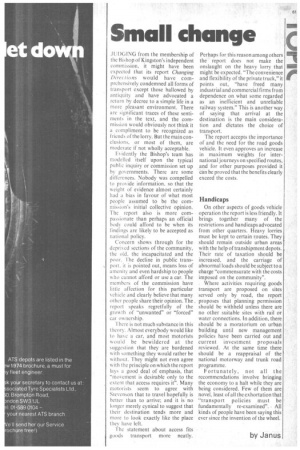Small change
Page 63

If you've noticed an error in this article please click here to report it so we can fix it.
JU DGING from the membership of the Bishop of Kingston's independent commission, it might have been expected that its report Changing Directions would have cOmprehensively condemned all forms of transport except those hallowed by antiquity and have advocated a return by decree to a simple life in a more pleasant environment. There are significant traces of these sentiments in the text, and the commission would obviously not think it a compliment to be recognized as friends of the lorry. But the main conclusions, or most of them, are moderate if not wholly acceptable.
Evidently the Bishop's team has modelled itself upon the typical public inquiry or commission set up by governments. There are some differences. Nobody was compelled to provide information, so that the weight of evidence almost certainly had a bias in favour of what most people assumed to be the commission's initial collective opinion. The report also is more compassionate than perhaps an official body could afford to he when its findings are likely to be accepted as national policy.
Concern shows through for the deprived sections of the community, the old, the incapacitated and the poor. The decline in public transport. it is pointed out, means loss of amenity and even hardship to people ho cannot afford or use a car. The members of the commission have little affection for this particular vehicle and clearly believe that many other people share their opinion. The report speaks regretfully of the growth of "unwanted" or "forced" car ownership.
There is not much substance in this theory. Almost everybody would like to have a car, and most motorists would be bewildered at the suggestion that they are burdened with something they would rather be without. They might not even agree with the principle on.which the report lays a good deal of emphasis, that "movement is desirable only to the extent that access requires it". Many motorists seem to agree with Stevenson that to travel hopefully is better than to arrive; and it is no longer merely cynical to suggest that their destination tends more and more to look exactly like the place they have left.
The statement about access fits goods transport more neatly. Perhaps for this reason among others the report does not make the onslaught on the heavy lorry that might be expected. "The convenience and flexibility of the private truck," it points out, "have freed many industrial and commercial firms from dependence on what some regarded as an inefficient and unreliable railway system." This is another way of saying that arrival at the destination is the main consideration and dictates the choice of transport.
The report accepts the importance of and the need for the road goods vehicle. It even approves an increase in maximum weights for international journeys on specified routes, and for other purposes provided it can be proved that the benefits clearly exceed the costs.
Handicaps
On other aspects of goods vehicle operation the report is less friendly. It brings together many of the restrictions and handicaps advocated from other quarters. Heavy lorries must be kept to certain routes. They should remain outside urban areas with the help of transhipment depots. Their rate of taxation should be increased, and the carriage of abnormal loads should be subject to a charge "commensurate with the costs imposed on the community".
Where activities requiring goods transport are proposed on sites served only by road, the report proposes that planning permission should be withheld unless there are no other suitable sites with rail or water connections. In addition, there should be a moratorium on urban building until new management policies have been carried out and current investment proposals reviewed. At the same time there should be a reappraisal of the national motorway and trunk road programme.
Fortunately, not all the recommendations involve bringing the economy to a halt while they are being considered. Few of them are novel, least of all the exhortation that "transport policies must be fundamentally re-examined". All kinds of people have been saying this ever since the invention of the wheel.
by Janus
























































































































































